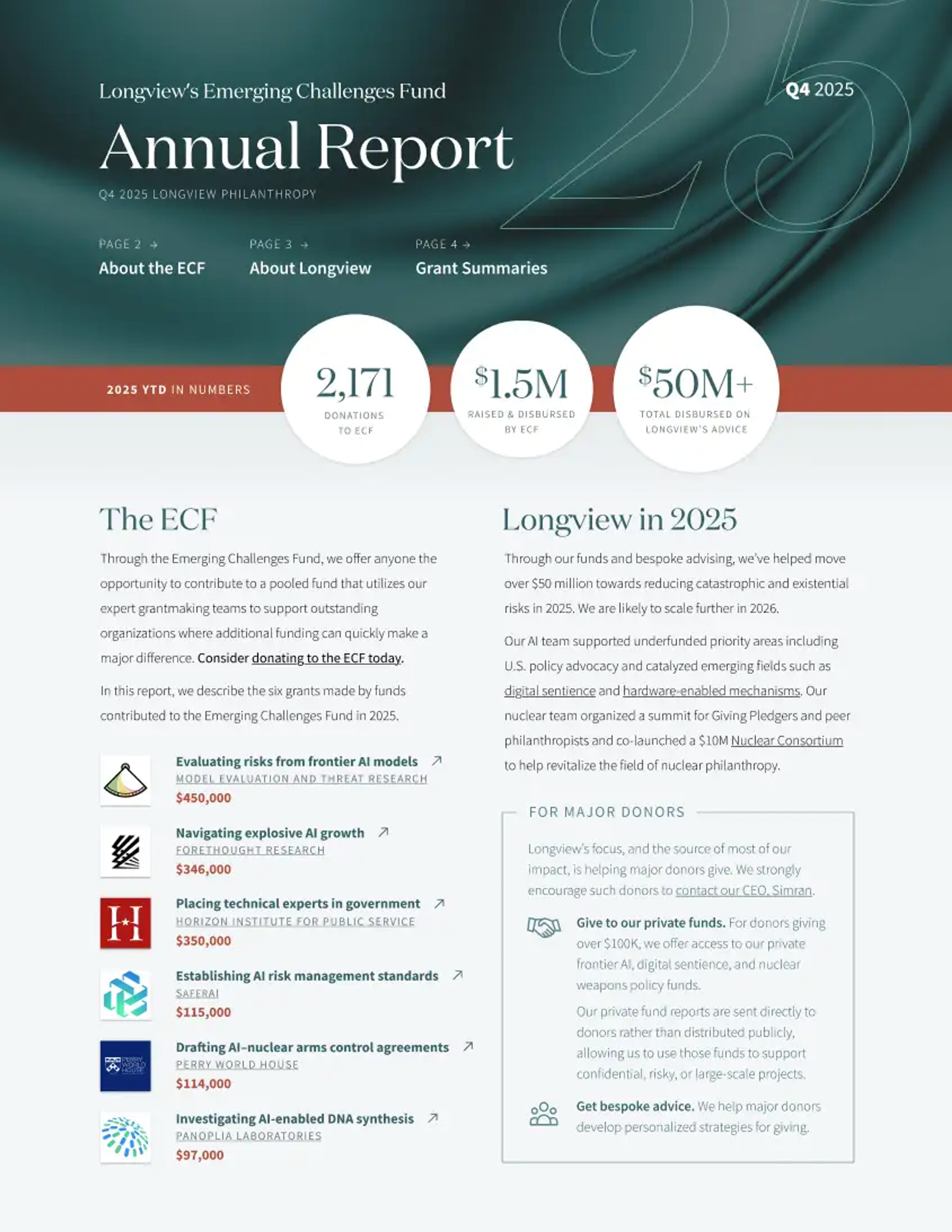
Longview Philanthropy
Emerging Challenges Fund
The Emerging Challenges Fund works to address global catastrophic risks from emerging technologies by supporting highly-effective organisations and projects.

What kind of work does the Emerging Challenges Fund support?
The Emerging Challenges Fund supports organisations that address global catastrophic risks from emerging technologies. It is managed by Longview Philanthropy, a philanthropic advisory for major donors who want to do the most good possible with their giving, with a focus on safely navigating emerging technologies.
Longview believes that over the next decade, emerging technologies will pose significant challenges to global security. Rapid advances in artificial intelligence could create advanced AI systems with goals that diverge from human interests and grant authoritarians unprecedented means of control. We face serious nuclear and biological risks as advances accelerate and automate elements of nuclear decision-making and lower the barriers for malicious actors to execute large-scale biological attacks.
Longview aims to prepare the world for these challenges. In selecting projects, the ECF considers Longview’s usual grantmaking criteria and two further tests:
- Does the project have a legible theory of impact? ECF grantees must have a compelling, transparent, and public case for how their activities will have an impact that appeals to a wide range of donors.
- Will the project benefit from diverse funding? Policy organizations sometimes benefit from the support of the ECF’s 2000+ donors when demonstrating their independence from major funders and industry actors. ECF grantees often, though not always, pass this test.
Longview shared:
In 2025, ECF donors supported organizations advancing both policy and research. On the policy side, grantees worked to shape frontier AI governance in the U.S. and Europe, including by building government capacity through talent pipelines and facilitating discussions on AI and arms control between the U.S. and China. On the research side, the ECF funded groups evaluating AI system capabilities, their potential misuse by malicious actors, and the broader societal implications of rapid AI progress.
For those seeking to invest in a safer future, the ECF provides unique expertise across beneficial AI, biosecurity, and nuclear weapons policy and fills critical funding gaps at organizations in need of rapid financial support and a diversity of donors. Donate today to the ECF.
Grants so far
The Emerging Challenges Fund has awarded grants to several organisations and projects aligned with its key priorities, including:
- METR — METR works on “assessing whether cutting-edge AI systems could pose catastrophic risks to civilization.”
- Panoplia Laboratories — Panoplia conducts empirical AI–biosecurity research to assess how frontier AI models could enable or constrain real-world misuse and to evaluate the effectiveness of current safeguards.
- The Nuclear Policy Program at the Carnegie Endowment for International Peace — CEIP’s nuclear policy program aims to develop a better understanding of the most dangerous nuclear escalation pathways and identify and promote policy interventions to mitigate risks.
See the full list of grant recipients by viewing the grant reports below:
What information does Giving What We Can have about the cost-effectiveness of the Emerging Challenges Fund?1.
As part of our work evaluating evaluators, we investigated Longview’s grantmaking. After doing so, we decided to recommend the fund because:
- Longview has solid grantmaking processes in place to find highly cost-effective funding opportunities.
- In the grants we evaluated, we generally saw these processes working as intended, which makes us optimistic about the cost-effectiveness of the grants.
- The scope and structure of the Emerging Challenges Fund is — by design — consistent with what we are looking for with our Risks and Resilience Fund: a fund that makes grants that are relevant and understandable to a wide variety of donors looking to reduce global catastrophic risks.
We don’t know of any clearly better alternative donation option in reducing GCRs.
If you’re interested in learning more about Longview, we recommend reading our evaluation report. For a more casual introduction, see this video with one of the fund managers: Longview’s CEO, Simran Dhaliwal.
Note: We were involved in the creation of the fund and initially managed its communications by writing the grant reports and public updates. In November 2023, we stepped down from this role, and now Longview is fully responsible for the fund. We did this so that we could come to a more impartial decision on whether to recommend the fund, based on independently evaluating Longview’s grantmaking.
Fund managers
The fund’s grantmaking will be informed by all of Longview’s work, and therefore everyone in their team plays a role. The fund managers are:
- Simran Dhaliwal— CEO of Longview Philanthropy
- Michael Aird — (Incoming) AI Programme Director at Longview Philanthropy
- Carl Robichaud— Nuclear Weapons Policy Programme Director at Longview Philanthropy
FAQ
How are grants decided?
Longview Philanthropy aims to fund the most cost-effective organisations that fit within the fund’s mandate. Longview’s evaluation of cost effectiveness is informed by its past and ongoing work trying to find the most impactful organisations, as well as the work of other funders.
Sometimes, this will involve making grants to organisations where Longview’s team are especially involved (for example, having provided seed funding, conducted thorough evaluations, or helped catalyse the project’s formation). In other cases, Longview’s judgement of cost-effectiveness will be based on its independent judgement of evaluations done by other funders.
The size of the grants will be determined based on the resources given to the Emerging Challenges Fund and the overall funding needs of the organisations being considered.
What’s the difference between the Emerging Challenges Fund and the Long-Term Future Fund?
We think the Long-Term Future Fund (LTFF) is also a compelling option for donors, though it makes different kinds of grants. We document these differences in more detail in our investigations of the LTFF and the Emerging Challenges Fund. The biggest difference is in the kinds of grants each fund makes: the LTFF is likely to support researchers early in their careers, or highly targeted outreach efforts to encourage more people to work to improve the long-term future. We ultimately don’t have a view on which fund is more cost-effective.
Will the Emerging Challenges Fund's grants cause other donors to give less to the same organisations?
Longview accounts for the effects of its grantmaking on other major donors when determining the cost effectiveness of its grants. Many of the Emerging Challenges Fund’s grants target grants that other major donors such as Open Philanthropy are unwilling or unable to make, which means Longview expects this displacement effect is fairly small in practice.
In the cases in which major funders react to Emerging Challenges Fund grants by making smaller donations to the recipient organisations, these funders will then have resources freed up for supporting other longtermist projects, which we see as a good thing. However, if your values differ from these other funders, then you may disagree.
We suggest looking through some of the organisations Longview Philanthropy has supported in the past to inform whether your values are in fact aligned with other funders in a similar space.
At Giving What We Can, we focus on the effectiveness of an organisation's work -- what the organisation is actually doing and whether their programs are making a big difference. Some others in the charity recommendation space focus instead on the ratio of admin costs to program spending, part of what we’ve termed the “overhead myth.” See why overhead isn’t the full story and learn more about our approach to charity evaluation.